Sudden Erectile Dysfunction: What Causes It and How to Treat It
Written by Dr. Deepali Anand

Dr. Deepali is a medical writer and healthcare professional with a background in clinical surgery and patient care. Having transitioned from active clinical practice to medical communications, she specializes in bridging the gap between complex clinical data and patient education. Dr. Deepali is dedicated to creating evidence-based content that is grounded in scientific rigor and empathy, ensuring that sensitive topics like sexual wellness and mental health are accessible and empowering for every reader.
•
July 29, 2025
Our experts continually monitor the health and wellness space, and we update our articles when new information becomes available.

Quick Read
Sudden erectile dysfunction is when you unexpectedly lose the ability to get or maintain an erection despite everything working fine before. The causes range from psychological factors like performance anxiety, stress, or depression, to physical issues including blood flow problems, nerve damage, hormonal imbalances, or medication side effects. The good news is that most cases are highly treatable: don't panic if it happens once, note any recent life changes or new medications, communicate openly with your partner, and seek medical help if it persists or comes with concerning symptoms like chest pain or numbness. Whether the solution involves stress management, lifestyle changes, medication adjustments, or treating underlying health conditions, taking action early puts you back in control of your sexual health and overall well-being.
Sudden erectile dysfunction is when a man unexpectedly loses the ability to get or maintain an erection, even if everything was working fine before. It can happen at any age and is often caused by stress, anxiety, lifestyle changes, or certain medications. But in some cases, it may also signal an underlying health issue like heart disease or hormonal imbalance.
In this article, we’ll explore what causes sudden ED, how to tell if it’s physical or psychological, what to do when it happens, and when to seek medical help. If this has happened to you, you're not alone, and there are clear steps you can take to get back on track.
Can Erectile Dysfunction Happen Suddenly?
Erectile Dysfunction is the loss of erectile function. It is usually a gradual process that starts slowly and develops into a full-blown condition in a few years if not intervened in. But erectile dysfunction can happen suddenly, and when this happens suddenly, unexpectedly out of the blue, it is a sudden erectile dysfunction.
One of the major myths is that ED is an old-age thing that develops over time, but it can happen suddenly in young men as well. This sudden loss of erection is mostly because of some medication, lifestyle change, or psychological issue. But it can sometimes be a signal of some underlying major disease developing in the body.
Allo asks
Have you or your partner ever experienced sudden loss of erection?
What Causes Sudden Erectile Dysfunction
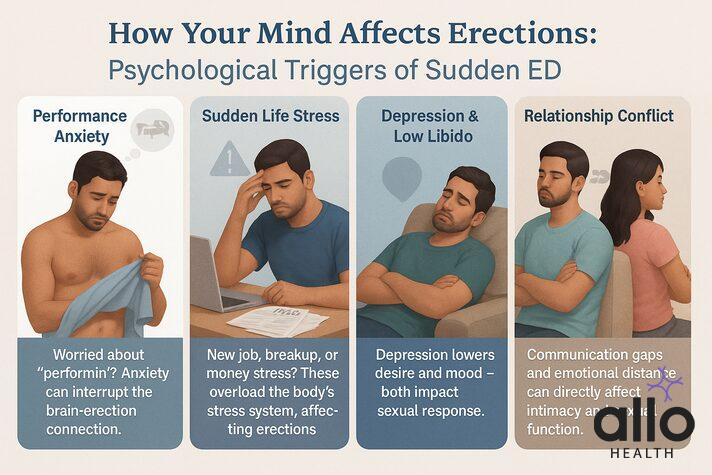
1. Psychological Issues
- Performance anxiety(sexual performance anxiety), the anxiety of performing before and during sexual activity with a sexual partner. It can develop suddenly, especially in a new relationship or if any previous episode of ED has occurred. It affects 9-25% of men and creates a vicious anxiety-ED cycle.[1]
- Sudden stress, like a new job, financial problems, relationship change, etc, can affect the nerve pathways responsible for erection, creating erection problems.
- Depression is another leading cause of sudden loss of erection and erectile problems in men. It also affects libido and sexual desire, which further increases erection problems.
- Relationship problems, changes, and communication gaps directly affect mental health as well as sexual performance.
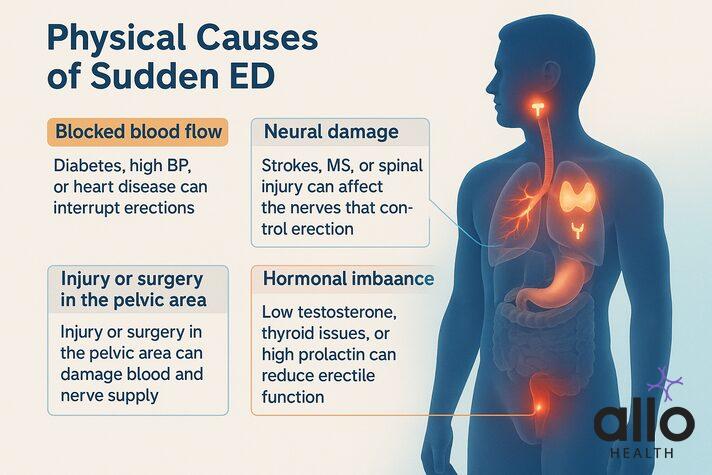
2. Physical Causes
- Low blood flow to the penis due to diseases affecting the blood vessels, like diabetes, sudden high blood pressure, and heart attacks, can directly cause sudden loss of erection.
- Any nerve damage due to strokes, multiple sclerosis, parkinson's disease, which directly affects the nervous system, affects the nerves responsible for erection.[2]
- Injury or trauma to the penis, like a penis fracture, pelvic surgery, or spinal cord injury, can damage the nerves and blood vessels responsible for erections.
- Hormonal disturbances like a sudden drop in testosterone levels, hypothyroidism, and high prolactin levels(hyperprolactinemia) can impair erectile function.
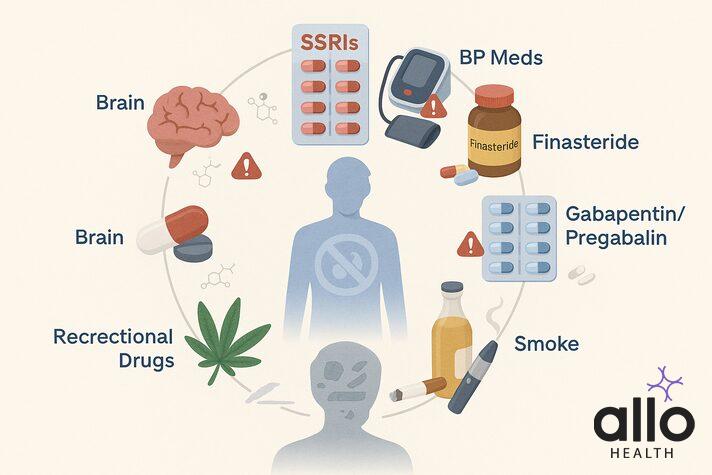
3. Medications and Substance Use
Medication side effects are responsible for 25% of all ED causes[3]. Some of the common medications causing erectile dysfunction are:
- Antidepressants like SSRIs (citalopram) can cause erectile dysfunction.
- High blood pressure medications like beta blockers, thiazides are more likely to develop erectile dysfunction as compared to those on other medications.
- Hair loss medications like Finasteride and dutasteride are also known to cause erectile dysfunction.
- Some mental health and nerve pain medicines, like antipsychotics, benzodiazepines, gabapentin, or pregabalin, can affect brain chemicals and cause erection issues.
- Alcohol, recreational and illicit drugs(cocaine, marijuana, opiates), nicotine, and smoking cigarettes affect both the blood flow and nervous system, which can cause immediate erectile difficulties.
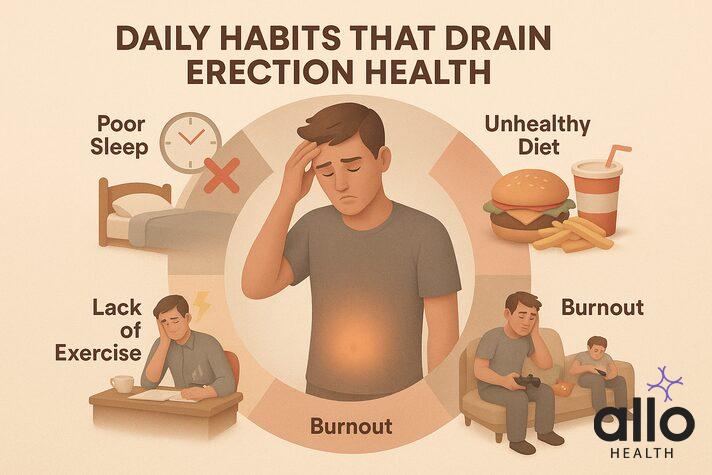
4. Lifestyle and Fatigue
- Poor sleep, poor diet, and lack of physical activity affect various systems of the body, including the systems required for erection.
- Along with this, overexertion and burnout also harm the erectile function.
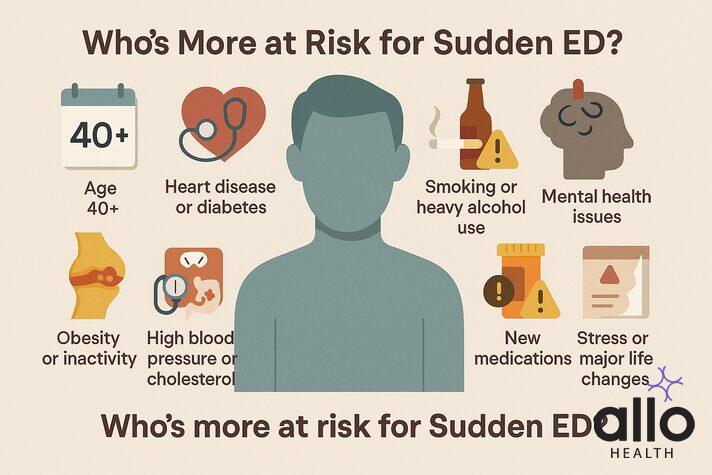
5. Risk Factors
Several factors can make sudden erectile issues more likely, including:
- Age 40+
- Heart disease or diabetes
- High blood pressure or cholesterol
- Smoking or heavy alcohol use
- Obesity or inactivity
- Mental health issues
- New medications
- Stress or major life changes
The key to treating sudden ED is understanding what’s behind it. Sometimes it’s stress or anxiety; other times it could be a medication or health condition. Either way, the first step is to not panic, just observe and talk to your doctor.
Sudden Erection Dysfunction as a Warning Sign
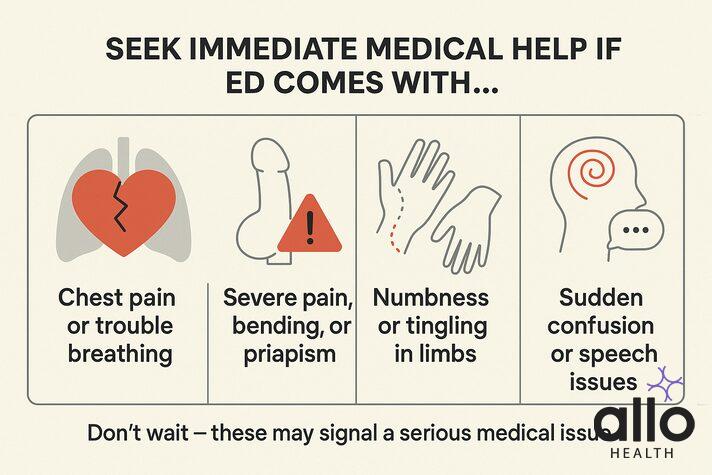
Sudden loss of erection is not always due to some sudden change in the body, which can be resolved by reversing the cause. It might also be signaling something bigger and major happening in the body which needs immediate medical attention.
Erectile dysfunction can be an early warning sign of cardiovascular disease, high cholesterol levels, or some underlying disease. As erectile dysfunction appears years before the cardiovascular disease starts showing any signs, it can be used to prevent it.
Seek immediate help from health care professionals if sudden erectile dysfunction comes with:
- Chest pain or difficulty breathing
- Penile pain, bending, or a prolonged erection (priapism)
- Numbness, weakness, or tingling in any part of the body
- Sudden confusion, trouble speaking, or other stroke-like symptoms
Allo asks
Do you think ED can signal hidden health problems?
What Should You Do in Sudden Erectile Dysfunction
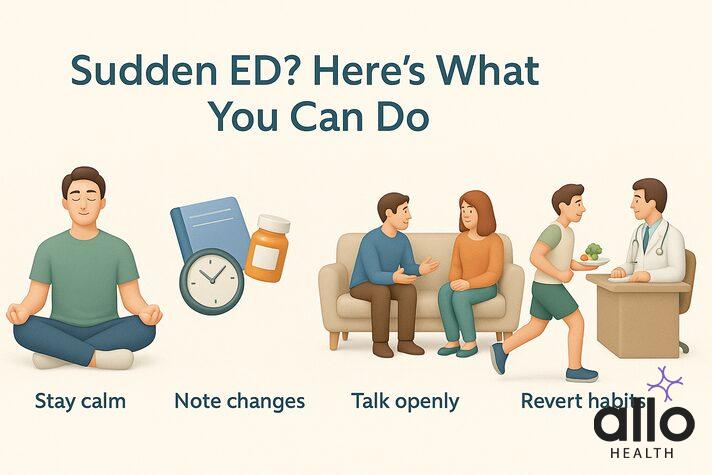
It can be really scary and embarrassing to have a sudden loss of erection, but it is normal and happens more often to many men than you realise. Let's go step by step on what you can do if it happens to you:
1. Do not panic; if it happens once, it's likely it might not happen again, and is just a one-time thing.
2. Make a note of recent stress, sleep patterns, any new medications, and lifestyle changes.
3. Communication is the key. Communicate what you are facing with your partner.
4. If you do not have any medical history and going back to your previous lifestyle helps in not having a sudden loss of erection, then you can wait and watch.
5. If it is because of the new drugs or you are on the risk list and it is happening more often, it is a good thing to consider the help of a health care professional.
How to Tell What’s Causing Sudden ED
Identifying the pattern helps your doctor figure out the underlying cause. Sudden ED is often psychogenic, but physical issues, especially vascular or nerve-related, must not be missed.
Feature
Psychogenic ED
Organic(physical) ED
Onset
Suddenly, often after stress or relationship pressure
Gradual worsening over time
Erection Quality
Normal during sleep and masturbation
Poor or absent even during sleep
Sex Drive
Normal
May be reduced if hormonal or blood flow causes are present
Situational
Variability
Can get erections in some situations (e.g., solo), not with a partner
Consistently poor erections in all settings
Risk Factors
Emotional stress, anxiety, and relationship strain
Diabetes, hypertension, high cholesterol, smoking, trauma
Associated
Symptoms
Usually none
May include penile pain, curvature, urinary or nerve issues
Treatment Options for Sudden Erectile Dysfunction
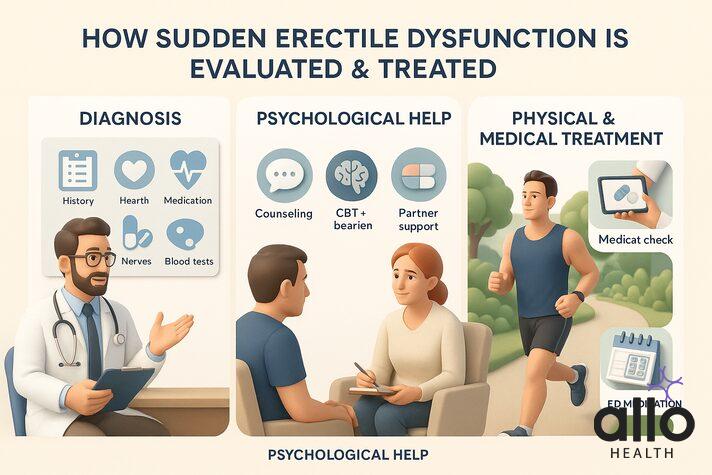
First Steps: How ED Is Evaluated
When you visit a doctor for sudden ED, they’ll start by asking about when it began, your stress levels, relationship context, health history, medications, and lifestyle choices like smoking cigarettes or alcohol use.
A physical exam may follow lab tests to check blood flow, nerve function, and any signs of penile or hormonal issues. If needed, they may order blood tests to assess sugar levels, cholesterol, and testosterone to rule out underlying conditions.[4]
If It’s Psychological (Psychogenic ED)
- Reassurance: One-off erection issues are normal and very common
- Counseling: Therapy or stress-reduction techniques (like CBT) can help
- Partner support: Talking openly with your partner often eases the pressure
If It’s Medication or Substance Related
- Medication check: Your doctor may adjust or switch medicines
- Cutting back: Reducing alcohol, quitting recreational drugs
- Quit smoking: It improves both heart and sexual health
If It’s Organic (Physical Cause)
- Lifestyle changes: Physical activity, healthier eating, weight loss
- Manage chronic underlying conditions: Like diabetes, high BP, high cholesterol, and vascular disease.
- ED Medications: PDE5 inhibitors (like sildenafil or tadalafil), hormone therapy
Real Insights from Allo Health
Out of 1,72,620+ patients at Allo Health, 75,084 men came to us with erectile dysfunction.
Around 1 in 3 cases involved sudden ED.
40% of sudden ED patients were under age 35.
Most saw improvement in 6–12 weeks with basic treatment and support.
This shows that sudden erectile dysfunction is common, especially in young men, and often reversible with timely care.
Can Erectile Dysfunction Happen Suddenly in Young Men

What Makes It Different?
In younger men, sudden ED is usually psychological, not physical[5]. Unlike older men, who often experience conditions like heart disease or diabetes, young men often experience ED due to stress, anxiety, or performance pressure.
While sudden ED in young men is rarely due to a serious medical issue, ongoing problems should be assessed with care, focusing on mental health, relationships, and lifestyle factors that can be improved.
Common Triggers
- Common triggers include performance anxiety, stress, depression, relationship issues, and lifestyle factors (e.g., alcohol, drugs).
- Social media and internet use fuel unrealistic expectations, self-pressure, and anxiety, all of which can contribute to ED.
- Most cases are temporary and reversible, but persistent ED may require professional support focused on mental health and communication, rather than medication.
Final Thoughts
Sudden erectile dysfunction can be unsettling and scary, but it's more common and more treatable than many realize. Often, it’s linked to stress or temporary factors. Still, it’s important not to brush it off, as it could signal an underlying health issue that deserves attention.
Taking action early puts you back in control. Your sexual health matters, and with the right support, you can get back to feeling confident, connected, and in charge of your body.
Disclaimer
The following blog article provides general information and insights on various topics. However, it is important to note that the information presented is not intended as professional advice in any specific field or area. The content of this blog is for general educational and informational purposes only. The content should not be interpreted as endorsement, recommendation, or guarantee of any product, service, or information mentioned. Readers are solely responsible for the decisions and actions they take based on the information provided in this blog. It is essential to exercise individual judgment, critical thinking, and personal responsibility when applying or implementing any information or suggestions discussed in the blog.
Most Asked Questions
How do you treat sudden erectile dysfunction?
Sudden ED treatment depends on the cause. If it’s due to stress or anxiety, therapy and lifestyle changes often help. If it’s linked to medications or health issues, adjusting those with a doctor’s help can make a big difference. In some cases, ED medications like sildenafil may be used.
Can sudden erectile dysfunction go away on its own?
Yes, if it’s caused by temporary stress, fatigue, or anxiety, it often improves on its own. But if it keeps happening, it’s a good idea to speak with a doctor to rule out deeper health issues.
How long does sudden ED usually last?
It varies. A one-time episode might last just a night, while stress-related ED could come and go for days or weeks. If it persists beyond a few attempts, get it checked to find the cause early.
Is sudden ED a sign of a serious health problem?
Not always, but sometimes, it can be a warning sign of issues like heart disease or hormone imbalance. If ED comes with symptoms like chest pain or numbness, seek help right away.
What should I do right after it happens?
Don’t panic. Try to relax and reflect on recent changes- stress, sleep, meds, or alcohol. Talk to your partner and see if the issue resolves. If it keeps happening, reach out to a doctor for guidance.
Sources
- 1.
Psychological Factors Related to Impotence as a Sexual Dysfunction in Young Men: A Literature Scan for Noteworthy Research Frameworks
- 2.
Neurogenic Erectile Dysfunction. Where Do We Stand?
- 3.
Medications Most Commonly Associated With Erectile Dysfunction: Evaluation of the Food and Drug Administration National Pharmacovigilance Database
- 4.
Current Diagnosis and Management of Erectile Dysfunction
- 5.
Evaluation of young men with organic erectile dysfunction


